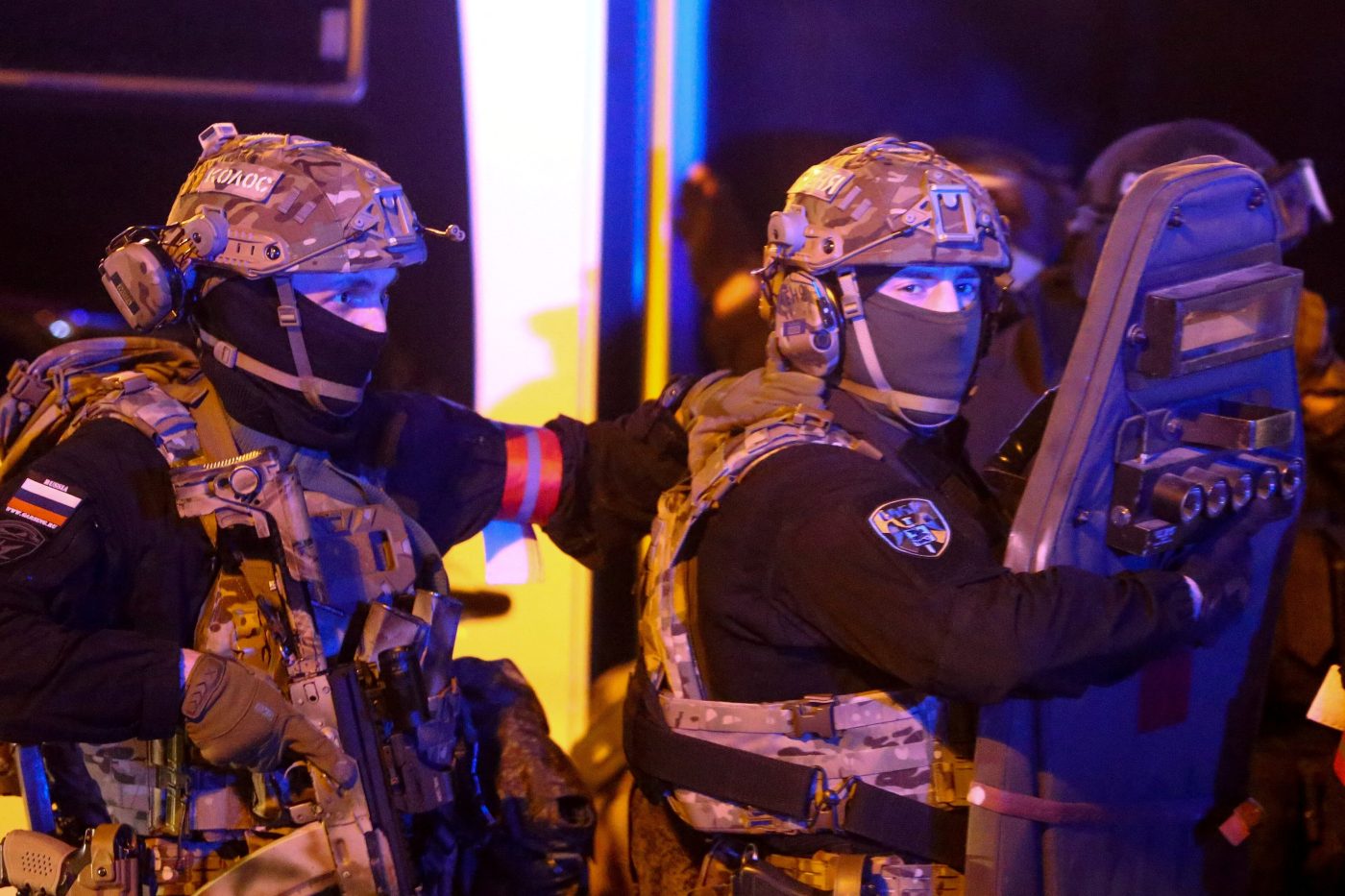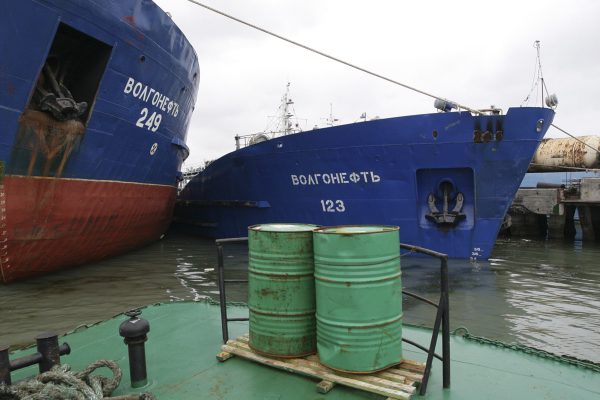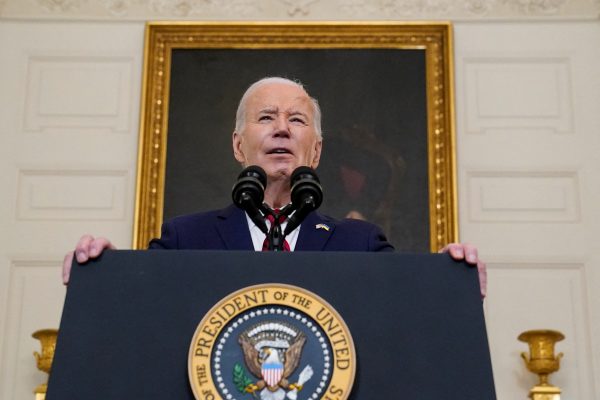The terrorist attack in Moscow concert hall, which killed 139 people and injured 180, amounts to a huge blow against Putin’s boast of stability, a pillar of his 25-year rule.
It was also an intelligence failure for the FSB, which was busy harassing supporters of opposition leader Alexey Navalny, who had died at the Kremlin’s hands in February. Its men and women had been fully occupied with throwing peaceful social media users into jail for anti-regime thought crime and persecuting Ukrainian civilians in the occupied territories.
Russia’s siloviki, the country’s security establishment, responded to the fiasco by changing the narrative. The attack on the capital city and the glaring failure of the heavily armed and numerous security forces to intervene during the 20-minute massacre was now, it argued, not a signal of Putin-regime incompetence, it was instead a sign of the giant global conspiracy against Russia.
As so often in the past, the director of the FSB explained that the old enemies — the US, Ukraine, and the UK — were behind the attack.
“We believe the action was prepared both by the radical Islamists themselves and, of course, facilitated by Western special services, and Ukraine’s special services themselves have a direct connection to this,” Alexander Bortnikov said.
Nikolai Patrushev, Russian Security Council Secretary, formerly the head of the FSB, was even more straightforward. When a journalist asked him whether ISIS (which claimed responsibility for the attack) or Ukraine was responsible for the attack, Patrushev replied, “Ukraine, of course.”
Both men were just parroting Putin’s narrative from a day earlier. He had accused Ukraine and the West of using radical Islamists, and claimed the attack on the concert hall was likely just another “in a series of attempts by those who have been fighting against our country since 2014, using the neo-Nazi Kiev regime as a pawn.”
The fact that the US warned Russia two weeks earlier of an “impending” assault, in Moscow, on a large gathering, “including concerts”, thus became a part of the narrative that the US and its friends actually organized the mass murder.
This idea will now take root in the fertile ground of various conspiracy groups at home and abroad, including Russian media, and will be fed to a population now familiar with this diet. Lacking independent media to offer fact-based reporting, and amid deep public skepticism about what’s really going on, the public space will be filled with a miasma of half-truths and outright lies (One of the most popular theories at the moment is that Putin is either dead or in hiding, and has been replaced by his double.)
The attack and its links to Tajiks have also fueled widespread xenophobia towards Central Asian migrants in Russian society, a sentiment long cultivated by the authorities. This prejudice is now useful as people argue that natives from that region “aren’t capable of organizing such a sophisticated attack.”
The conspiratorial mindset is not simply a lie for the little people; it is also shared by many in the security services. This belief that dark forces are perpetually at work to damage and destroy Russia is inherited from the KGB, and dates to the earliest days of Vladimir Putin’s reign.
As early as January 2001, less than a year after Putin became president, the two biggest Russian daily papers — Izvestia and Komsomolskaya Pravda — published front-page investigations about a Russian soldier-turned-terrorist, who the FSB said worked for Chechen separatists, Al Qaeda, and the CIA, at the same time.
The articles claimed that Vasily Kalinkin, a former army noncommissioned officer, defected to the Chechen side as early as in 1991, and was moved to a terrorist camp in Afghanistan where he was trained by an instructor with the ominous nickname “Bill.”
The newspapers, briefed by the FSB, claimed that Kalinkin returned to Russia in 1994, where he became a sleeper agent of the CIA. He then waited six years for orders to blow up the Volga Hydroelectric Station — the largest dam of its kind in Europe, which crosses the Volga River. When he got the orders, he surrendered himself to the FSB.
After publication, Kalinkin was paraded at a press conference, where he claimed the recruiting document he had signed had “in the left corner the Statue of Liberty and in the right the title ‘Osama bin Laden Diversion School.’”
Kalinkin then disappeared from public view, his job done. But the narrative of a world conspiracy of Western-trained and directed terrorists preparing terrible crimes against Russia became a staple of state propaganda.
At least until 9/11, when Putin and the FSB were forced to radically change the narrative. In the following years, the Kremlin proclaimed that it had joined the US in fighting the common enemy of global jihadism.
But old narratives never really die. They’re too useful when needed. Last month, Putin was interviewed by Tucker Carlson. All of a sudden, the old accusations of 2001 were back:
“I repeatedly asked the United States not to support separatism or terrorism in the North Caucasus. But they continued to do it anyway. And political support, information support, financial support, even military support came from the United States and its satellites for terrorist groups in the Caucasus.”
Putin’s reaction to the March 22 attack made clear that from now on, Western-Ukrainian conspiracies would be the meat and drink of the national narrative about terrorist threats.
The FSB investigators of terrorist attacks, traditionally the most competent part of the organization, will have no choice but to follow Putin’s lead. They will now have to chase, or pretend to chase, a phantom enemy even as they seek to protect the public.
The risk is clearly that Russian citizens will be more at risk rather than less. And that apparently doesn’t bother Putin, even if it makes the FSB less competent and less efficient in addressing the very real threat of terrorism.
Andrei Soldatov and Irina Borogan are Non-resident Senior Fellows with the Center for European Policy Analysis (CEPA.) They are Russian investigative journalists, and co-founders of Agentura.ru, a watchdog of Russian secret service activities.
Europe’s Edge is CEPA’s online journal covering critical topics on the foreign policy docket across Europe and North America. All opinions are those of the author and do not necessarily represent the position or views of the institutions they represent or the Center for European Policy Analysis.





